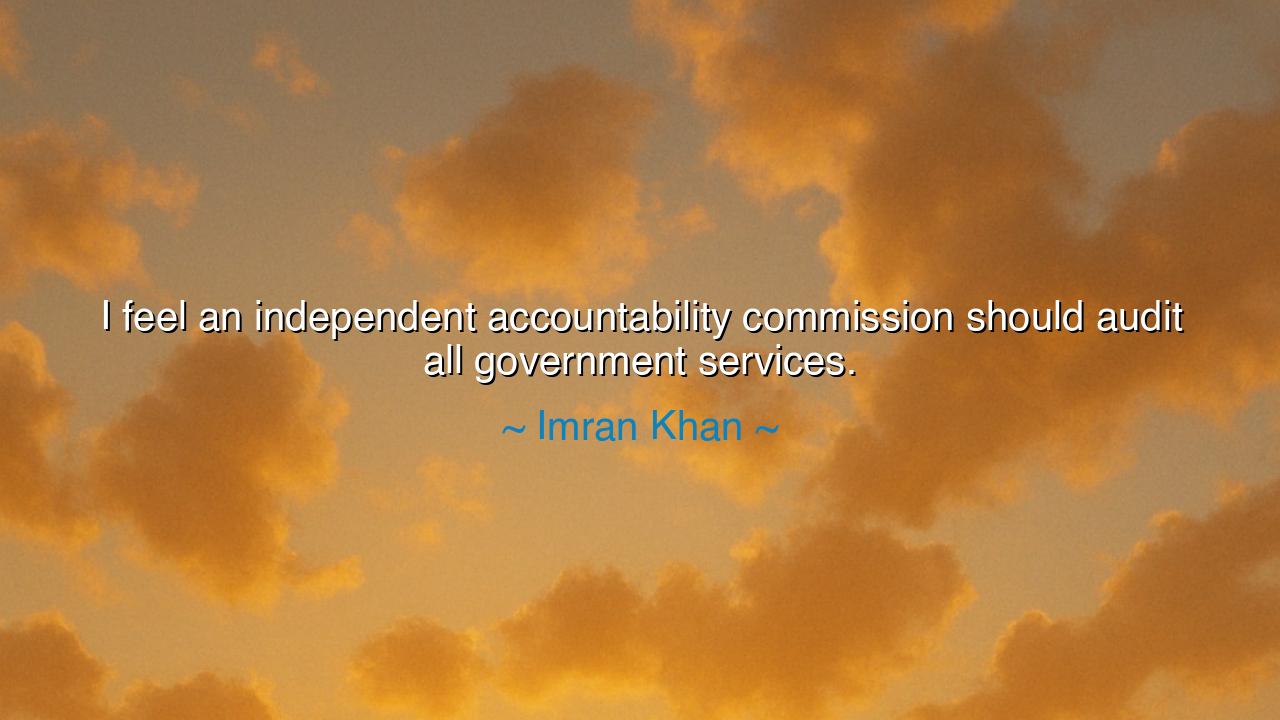
I feel an independent accountability commission should audit all






In the turbulent theater of politics, where promises echo louder than truth and power often blinds the powerful, the leader Imran Khan once declared a principle as timeless as justice itself:
"I feel an independent accountability commission should audit all government services."
These words rise not as a mere policy proposal, but as a moral summons — a call for integrity, transparency, and truth in governance. In them lives the ancient understanding that power, when left unchecked, corrupts not only the rulers but the very soul of the nation they govern. Accountability, in its purest form, is the mirror of righteousness: it reflects truth back to power and ensures that no man, no office, no institution stands above the law. Khan’s statement is both a warning and a vow — a recognition that without oversight, authority decays into tyranny, and that without justice, nations crumble from within long before they are conquered from without.
The meaning of this declaration runs deep into the moral foundations of statehood. When a government serves its people, it is sacred; when it serves itself, it is lost. An independent accountability commission, free from political influence and corruption, is the guardian of that sacred trust. It watches not as an enemy, but as a custodian — ensuring that wealth meant for the people does not vanish into private pockets, and that those who govern remain servants, not masters. In this vision, Imran Khan reminds us that justice must not be selective, nor transparency conditional. The state must be humble before its citizens, for they are the true sovereigns of the republic.
The origin of this thought can be traced not only to Khan’s political journey, but to his moral awakening as a man shaped by both triumph and struggle. From his days as a sportsman who brought glory to Pakistan, to his years of public service, he saw how corruption erodes the dignity of a nation — how roads go unbuilt, schools unfunded, hospitals unstaffed, not for lack of resources but for lack of honesty. He came to believe that accountability is not vengeance, but purification; not humiliation, but renewal. The independent commission he envisioned was meant to be a temple of truth, beyond the reach of partisanship or greed — a force to remind every minister and official that their office is not a privilege, but a trust held in the name of the people.
History itself bears witness to the wisdom of his words. In the ancient republic of Rome, corruption was the first crack in the marble of empire. The Senate, once noble, grew rich on the spoils of deceit, and the public treasury became a playground for the powerful. Yet when Cato the Younger rose to speak of virtue and accountability, he was mocked by those who feared exposure. In time, Rome fell not by sword, but by corruption — the slow decay of honor, the silent theft of conscience. And so it has been in every age: wherever the rulers cease to be accountable, the people cease to be free. Imran Khan’s call for independent oversight echoes the same eternal truth — that the survival of nations depends not on their wealth or armies, but on their moral spine.
But this teaching does not belong to rulers alone. It belongs to every citizen, for accountability is not merely a government’s duty — it is a people’s demand. A vigilant public is the true commission that keeps power honest. When citizens ask questions, seek truth, and refuse to be silenced by apathy or fear, they become the living conscience of the state. No law, no institution, can stand strong without the moral courage of its people. Thus, Imran Khan’s vision calls upon each of us to be watchful — to never surrender our right to truth, and to remember that silence in the face of corruption is itself a form of betrayal.
His words also speak of independence — a term as powerful as it is delicate. To be truly independent, an accountability commission must answer to no ruler, no faction, no favor, but only to the principles of justice. It must act without fear, yet without malice; it must reveal truth not to destroy, but to cleanse. In such independence lies the hope of every democracy — that the machinery of state may correct itself before it collapses under its own deceit. It is a vision of courage: that even those in power should welcome scrutiny, for only by light can shadows be dispelled.
So let this teaching stand as a law of moral governance: where there is no accountability, there can be no justice; and where there is no justice, there can be no peace. Let leaders, like Imran Khan, remember that power is not a crown, but a cross to bear in service of the people. Let citizens remember that demanding accountability is not rebellion, but patriotism. And let every nation, east or west, rich or poor, remember that truth — though often uncomfortable — is the only foundation upon which freedom can endure.
Thus ends the teaching: build your governments upon transparency, your institutions upon honor, and your hearts upon truth. For when rulers are accountable and people are vigilant, no empire of corruption can stand — and the nation, purified by light, will rise toward its destined greatness.






AAdministratorAdministrator
Welcome, honored guests. Please leave a comment, we will respond soon